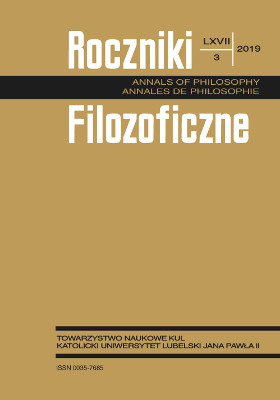Edward A. Milne’s Philosophy of Science: Between Aristotelianism and Popperism
Abstrakt
Filozofia nauki Edwarda A. Milne’a: między arystotelizmem a popperyzmem
Artykuł jest próbą wykazania, że E.A. Milne’a filozofia nauki ma swoje źródła w filozofii Arystotelesa i mogła stanowić inspirację dla Popperowskiego hipotetyzmu. O zgodności z koncepcją Arystotelesa świadczą następujące jej cechy: 1) celem nauki jest wyjaśnianie zjawisk przez odkrywanie ogólnych zasad; 2) istotną rolę w ich odkrywaniu spełnia umysł, choć doświadczenie ukierunkowuje poszukiwania; 3) dedukowanie szczegółowych twierdzeń z ogólnych założeń jest najważniejszym elementem badań. Z drugiej strony propozycja Milne’a jest zgodna z głównymi ideami koncepcji Poppera: 1) krytyką zasady indukcji; 2) preferowaniem metody hipotetyczno-dedukcyjnej (założenia mają charakter śmiałych hipotez i są akceptowane na podstawie wyników testów empirycznych); 3) docenieniem falsyfikacji i przekonaniem o skuteczności logiki dedukcyjnej.
Bibliografia
Berti, Enrico. 2015. Arystoteles w XX wieku. Translated by Anna Dudzińska-Facca & Danilo Facca. Warszawa: Wydawnictwo Instytutu Filozofii i Socjologii Polskiej Akademii Nauk.
Dąbek, Dariusz. 2006. “Czynnik empiryczny w kosmologii Edwarda Artura Milne’a.” Roczniki Filozoficzne 54, 2: 31–47. http://www.jstor.org/stable/43409837.
Dąbek, Dariusz. 2011. Kosmologia Edwarda Artura Milne’a i jej filozoficzne implikacje. Lublin: Wydawnictwo KUL.
Dingle, Herbert. 1931. “The Evolution of the Universe.” Nature 128, 3234: 699–722. DOI: 10.1038/128699a0.
Dingle, Herbert. 1937a. “Modern Aristotelianism.” Nature 139, 3523: 784–6. DOI: 10.1038/ 139784a0.
Dingle, Herbert. 1937b. “Deductive and Inductive Methods in Science: A Reply.” Nature 139, 3528: 1011–14. DOI: 10.1038/1391011a0.
Einstein, Albert. 1919. “Induktion und Deduktion in der Physik.” Berliner Tageblatt und Handelszeitung 25, Suppl 4: 1.
Einstein, Albert. 1934. “On the Method of Theoretical Physics.” Philosophy of Science 1, 2: 163–9. http://www.jstor.org/stable/184387.
Gale, George. 1991. “Rationalist programmes in early modern cosmology.” Astronomy Quarterly 8, 4: 193–218. DOI: 10.1016/0364-9229(91)90002-3.
Gale, George, and Niall Shanks. 1996. “Methodology and the birth of modern cosmological inquiry.” Studies in History and Philosophy of Modern Physics 27, 3: 279–96. DOI: 10.1016/S1355-2198(96)00008-1.
Hajduk, Zygmunt. 2012a. Filozofia nauk przyrodniczych. Lublin: Wydawnictwo KUL.
Hajduk, Zygmunt. 2012b. Ogólna metodologia nauk. 6th ed. Lublin: Wydawnictwo KUL.
Heller, Michał. 1978. “Uwagi o metodologii kosmologii.” Roczniki Filozoficzne 26, 3: 65–75. http://www.jstor.org/stable/43409547.
Kamiński, Stanisław. 1992. Nauka i metoda: Pojęcie nauki i klasyfikacja nauk. Lublin: Towarzystwo Naukowe Katolickiego Uniwersytetu Lubelskiego.
Kragh, Helge. 1996. Cosmology and controversy: The historical development of two theories of the universe. Princeton: Princeton University Press.
Lepeltier, Thomas. 2006. “Edward Milne’s influence on modern cosmology.” Annals of Science 63, 4: 471–81. DOI: 10.1080/00033790600718578.
Markie, Peter. 2017. “Rationalism vs. Empiricism.” In The Stanford Encyclopedia of Philosophy (Fall 2017 ed.), edited by Edward N. Zalta. https://plato.stanford.edu/archives/fall2017/entries/rationalism-empiricism/(10.04.2018).
McCrea, William H. 1939. “The Evolution of Theories of Space-Time and Mechanics.” Philosophy of Science 6, 2: 137–62. DOI: 10.1086/286542.
McCrea, William H. 1951. “Edward Arthur Milne, 1896–1950.” Obituary Notices of Fellows of the Royal Society 7, 20: 420–43. DOI: 10.1098/rsbm.1951.0010.
Milne, Edward A. 1929a. “The Masses, Luminosities, and Effective Temperatures of the Stars.” Monthly Notices of the Royal Astronomical Society 90, 1: 17–54. DOI: 10.1093/mnras/90.1.17.
Milne, Edward A. 1929b. The Aims of Mathematical Physics: An Inaugural Lecture delivered before the University of Oxford on 19 November 1929. Oxford: Clarendon Press.
Milne, Edward A. 1933. “World-Structure and the Expansion of the Universe.” Zeitschrift für Astrophysik 6: 1–95. http://adsabs.harvard.edu/abs/1933ZA......6....1M.
Milne, Edward A. 1934. “Some Points in the Philosophy of Physics: Time, Evolution and Creation.” Philosophy 9, 33: 19–38. DOI: 10.1017/S0031819100030564.
Milne, Edward A. 1935. Relativity, gravitation and world-structure. Oxford: Clarendon Press.
Milne, Edward A. 1937. “On the Origin of Laws of Nature.” Nature 139, 3528: 997–9. DOI: 10.1038/139997a0.
Milne, Edward A. 1941. “Remarks on the Philosophical Status of Physics.” Philosophy 16, 64: 356–71. DOI: 10.1017/S0031819100002795.
Milne, Edward A. 1943. “Rational electrodynamics.—I. The limitations of classical electromagnetism.” Philosophical Magazine and Journal of Science 34, 229: 73–82. DOI: 10.1080/14786444308520829.
Milne, Edward A. 1944. “The Fundamental Concepts of Natural Philosophy.” Proceedings of the Royal Society of Edinburgh. Section A. Mathematical and Physical Sciences 62, 1: 10–24. DOI: 10.1017/S0080454100006361.
Milne, Edward A. 1945. “Kinematic relativity: A reply to Prof. W. Wilson.” The London, Edinburgh, and Dublin Philosophical Magazine and Journal of Science 36, 253: 134–143. DOI: 10.1080/14786444508520911.
Milne, Edward A. 1948. Kinematic relativity: A sequel to relativity, gravitation and world structure. Oxford: Clarendon Press.
Milne, Edward A. 1952. Modern cosmology and the Christian idea of God, Oxford: Clarendon Press.
Turek, Józef. 2009. “Albert Einstein prekursorem hipotetyzmu Karla Poppera.” In Wokół Einsteina. Dylematy filozofów i fizyków, edited by Zdzisław Błaszczak and Antoni Szczuciński, 173–88. Poznań: Wydawnictwo Naukowe Uniwersytetu im. Adama Mickiewicza w Poznaniu.
Whitrow, Gerald J. 1943. “Axiomatic Treatment of Kinematical Relativity: A Reply to Dr G.C. McVittie.” Proceedings of the Royal Society of Edinburgh. Section A: Mathematics 61, 3: 298–99. DOI: 10.1017/S0080454100006300.
Whitrow, Gerald J. 1993. “Milne’s Cosmology.” In Encyclopedia of Cosmology: Historical, Philosophical, and Scientific Foundations of Modern Cosmology, edited by Norriss S. Hetherington, 410–16. New York: Garland Publishing.
Copyright (c) 2019 Roczniki Filozoficzne

Utwór dostępny jest na licencji Creative Commons Uznanie autorstwa – Użycie niekomercyjne – Bez utworów zależnych 4.0 Międzynarodowe.





